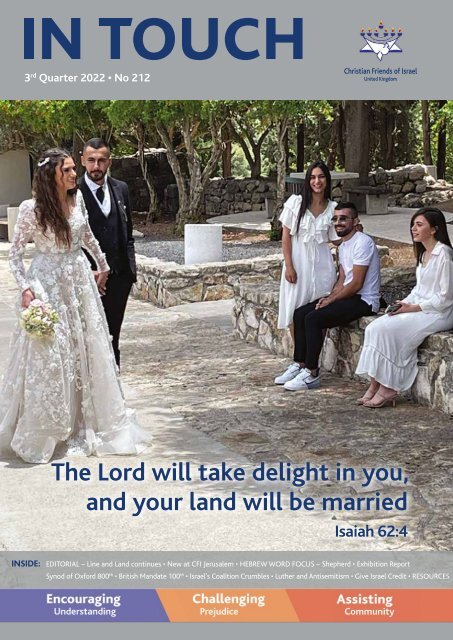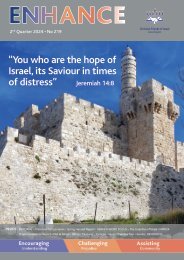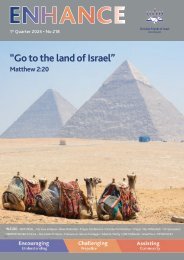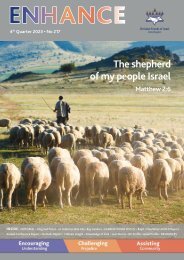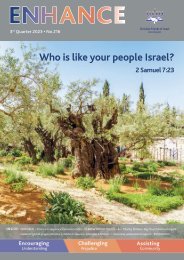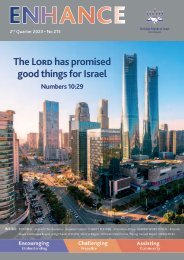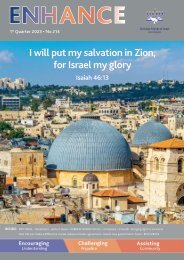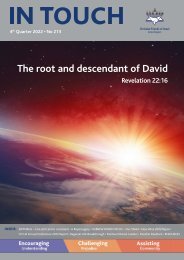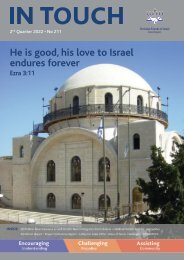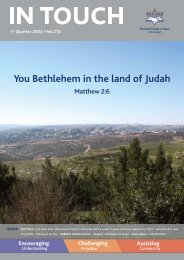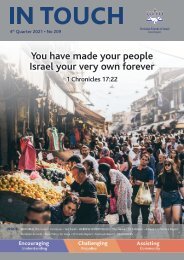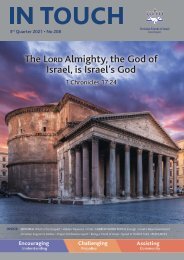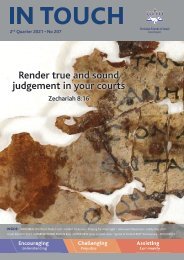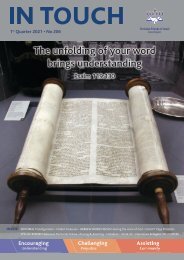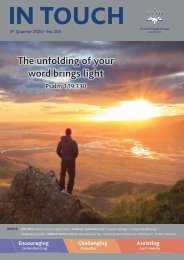In Touch - 3rd Quarter 2022
This edition contains a continuing editorial on the ‘Line and Land’, an introduction to CFI Jerusalem's new executive director, a report about our time at the Big Church Festival 2022; a news report about Israel's governing coalition; and a special guest feature titled 'Luther and Antisemitism'; as well as guest features about the 800th Anniversary of the Synod of Oxford and the Mandate 100 Luncheon in Parliament, plus an article titled 'Give Israel Credit' for the good it does for the whole world.
This edition contains a continuing editorial on the ‘Line and Land’, an introduction to CFI Jerusalem's new executive director, a report about our time at the Big Church Festival 2022; a news report about Israel's governing coalition; and a special guest feature titled 'Luther and Antisemitism'; as well as guest features about the 800th Anniversary of the Synod of Oxford and the Mandate 100 Luncheon in Parliament, plus an article titled 'Give Israel Credit' for the good it does for the whole world.
Create successful ePaper yourself
Turn your PDF publications into a flip-book with our unique Google optimized e-Paper software.
3 rd <strong>Quarter</strong> <strong>2022</strong> • No 212<br />
Christian Friends of Israel<br />
United Kingdom<br />
The Lord will take delight in you,<br />
and your land will be married<br />
Isaiah 62:4<br />
INSIDE: EDITORIAL – Line and Land continues • New at CFI Jerusalem • HEBREW WORD FOCUS – Shepherd • Exhibition Report<br />
Synod of Oxford 800 th • British Mandate 100 th • Israel’s Coalition Crumbles • Luther and Antisemitism • Give Israel Credit • RESOURCES
Christian Friends of Israel<br />
United Kingdom<br />
Editorial<br />
Jacob Vince<br />
Line and Land<br />
continues<br />
About us<br />
CFI UK seeks to bless Israel by<br />
means of practical and moral<br />
support, and to serve the Church in<br />
teaching about God’s purposes for<br />
Israel and the Hebraic heritage of<br />
our faith.<br />
CFI UK also produces a monthly<br />
prayer letter, a weekly audio Middle<br />
East Report and distributes the<br />
Haverim teaching CDs.<br />
Please contact us for full details<br />
of projects in Israel and also the<br />
teaching resources available.<br />
As an educational charity, we carry<br />
a variety of resources relevant to<br />
our purpose. We do not necessarily<br />
endorse every view expressed by<br />
our guest writers or authors.<br />
IN TOUCH Magazine<br />
Published by:<br />
CFI Charitable Trust<br />
PO Box 2687<br />
Eastbourne<br />
BN22 7LZ<br />
Tel: 01323 410 810<br />
Email: info@cfi.org.uk<br />
www.cfi.org.uk<br />
Registered Charity<br />
No. 1101899<br />
Registered Office c/o<br />
Caladine, Chantry House<br />
22 Upperton Road<br />
Eastbourne, BN21 1BF<br />
Company No: 04984515<br />
VAT Registration No: GB678780275<br />
facebook.com/cfiuk<br />
twitter.com/cfi_uk<br />
youtube.com/cfiuk<br />
Front cover photo:<br />
Bride and Groom at Kfar Bar’am,<br />
Northern Israel <strong>2022</strong><br />
As we seek to reference<br />
all Scripture (2 Timothy<br />
3:16), a good test is<br />
whether what we write or<br />
teach is found throughout,<br />
in all four sections of Law,<br />
Prophets, Psalms (Luke 24:44)<br />
and Apostles (Acts 2:42). All<br />
inspired so equal weight given<br />
to all.<br />
The scriptures themselves never<br />
elevate one part over another,<br />
unless by repetition.<br />
We pick up the theme from <strong>In</strong><br />
<strong>Touch</strong> 1 st <strong>Quarter</strong> <strong>2022</strong> editorial,<br />
which tracked the line and the land<br />
from the twin covenant promise<br />
made to Abraham of a child and a<br />
country, recorded in the first part<br />
of scripture, the Law.<br />
We look now at the line and the<br />
land in the Psalms’ section, where<br />
once again both are prominent.<br />
This section includes the wisdom<br />
books, the book of Ruth, where the<br />
family line of David is recorded,<br />
the five books of the Psalms, and<br />
the post exile books culminating<br />
in the summary history book of<br />
Chronicles.<br />
Almost all Christian Bible teachers<br />
would see connections in the five<br />
books of the Psalms to the ‘line’<br />
of Israel’s Messiah, too many to<br />
mention here, but to take as an<br />
example the most quoted psalm in<br />
the Apostles’ teaching, including<br />
by Jesus, apostle Peter in his first<br />
sermon, apostle Paul and the writer<br />
to the Hebrews,<br />
The Lord says to my Lord:<br />
“Sit at my right hand until I make<br />
your enemies a footstall of your<br />
feet.” (Psalm 110:1)<br />
Followed by,<br />
The Lord has sworn and will<br />
not change his mind: “You are<br />
a priest for ever, in the order of<br />
Melchizedek” (Psalm 110:4)<br />
But how many Christian Bible<br />
teachers see the connection to the<br />
covenant promise of the ‘land’ of<br />
Israel? Yet in the Psalms it is here<br />
most clearly and emphatically<br />
presented toward the end of the<br />
fourth book.<br />
‘Remember the wonders he<br />
has done, his miracles and the<br />
judgements he pronounced.<br />
O descendants of his servant<br />
Abraham [Israel], O sons of Jacob<br />
his chosen ones. He is the Lord our<br />
God, his judgements are in all the<br />
earth. He remembers his covenant<br />
forever, the word he commanded<br />
for a thousand generations.<br />
The covenant he made with<br />
Abraham, the oath he swore to<br />
Isaac. He confirmed it to Jacob as<br />
a decree, to Israel as an everlasting<br />
covenant’<br />
And what is this spectacularly<br />
introduced everlasting covenant,<br />
To you I will give the land of<br />
Canaan as the portion you will<br />
inherit’ (Psalm 105:5-11;<br />
1 Chronicles 16:12-18)<br />
Apart from changing ‘Abraham’<br />
to ‘Israel’, these exact words from<br />
Psalm 105 are repeated verbatim in<br />
1 Chronicles 16.<br />
Note the poetic balance, Israel is<br />
asked to remember the wonders of<br />
the Lord their God, as God, in turn,<br />
remembers his covenant promise of<br />
land. It is repeated in the Bible to<br />
assist in remembering. Scriptures’<br />
repetitions are always most<br />
important.<br />
So, as the third part of the Bible<br />
concludes, we see in Chronicles<br />
both the land and the line promises<br />
prominent. Chronicles has the<br />
most references to genealogy of any<br />
book, fifteen or so, showing both<br />
the line of the priesthood and the<br />
royal line of David, and, as we have<br />
already noted, also prominent is<br />
the land promise in the earlier text<br />
repeated from the Psalms.<br />
2 IN TOUCH • 3 rd <strong>Quarter</strong> <strong>2022</strong>
Update<br />
<strong>In</strong>troducing the new executive<br />
director of CFI Jerusalem<br />
Shalom to our UK friends<br />
Our God is a faithful God. He has certainly shown himself faithful<br />
to me over the years, not least in very recently returning me to<br />
Israel, so that I can now say together with the psalmist,“our feet<br />
are standing within your gates, O Jerusalem.” (Psalm 122:2).<br />
This recent move fulfils an assurance I was blessed to receive before I<br />
departed from Israel when I lived here previously, over ten years ago. I had<br />
been here working for the ministry, Bridges for Peace, thinking I had come<br />
for perhaps a few months, but in reality this happily turned out to be a few<br />
years. I was working in what for me was a dream role, leading work groups<br />
on many types of volunteer projects across Israel. It enabled me to assist in<br />
the lives of Israelis from all sorts of different backgrounds; a calling I yearned<br />
to fulfill, whilst at the same time providing me with an opportunity (living as<br />
I did within the Old City of Jerusalem) to grow amongst people and places<br />
Galya and Tristan Hall, CFI Jerusalem<br />
that taught me so many treasured lessons. Anyone who has visited Israel will<br />
know what I am alluding to. The echoes of the stories of the many places of the land of the Bible continue to reverberate<br />
throughout the ages; they have not dimmed. And in common with many people, when I left Israel to return home, I left a<br />
different man to the one who had arrived. I was never the same again.<br />
Our feet are standing within<br />
your gates, O Jerusalem<br />
Originally from Cornwall, in my student days I read history, and the latent archaeologist within me understands why the<br />
psalmist said of Jerusalem, “Your servants take pleasure in her stones, and show favour to her dust.” (Psalm 102:14). Howbeit,<br />
I eventually became a surveyor and valuer and had seasons in commerce when not absorbed in Israel-related ministry. And<br />
as interesting as my professional work was, my feet grew increasingly itchy as I waited and prayed for the next opportunity<br />
to move forward once again in the call to serve the Lord amongst the Jewish people. Imagine the joy when my wife was<br />
asked to work for the Zionist Federation in Cape Town (where Galya, my wife, hails from). Cape Town has a wonderful,<br />
close-knit Jewish community and the friendships between the Jewish and Christian communities there are beautifully<br />
close. It was really a gift to us to become part of strengthening those bonds. Before we left the UK, we also had a growing<br />
conviction that Lord would eventually lead us back to Israel from the tip of Africa, although we kept this mostly to<br />
ourselves as we were aware it may have sounded a bit outlandish (and perhaps to some, a bit crazy) especially as we had<br />
three children under ten with us.<br />
Yet, this is exactly what our faithful God has done. What a joy for us (and the children, too) to live once more in Israel and<br />
serve with Christian Friends of Israel, Jerusalem. Galya was privileged to work for several years at CFI Jerusalem in the past,<br />
working alongside Sharon in project Streams of Blessing, and I have long admired the Ruth ministry of CFI, since I first read<br />
some of Derek White’s booklets in the early days of my walk with the Lord. Now the times in which we live have grown<br />
darker, but the light is burning brighter, and we have seen how friends of Israel, faithful friends such as you – the readers of<br />
<strong>In</strong> <strong>Touch</strong>, are not fair-weather friends but have truly stood with Israel in the good times, and the hard. This is the hallmark<br />
of true friendship. Galya and I are privileged to be able to serve alongside you in this most special ministry.<br />
Tristan Hall, Executive Director, CFI Jerusalem<br />
3 rd <strong>Quarter</strong> <strong>2022</strong> • IN TOUCH 3
Hebrew Word Focus<br />
Melissa Briggs MA<br />
Hebrew University of Jerusalem<br />
Melissa is an experienced Hebrew<br />
teacher with a desire to make the<br />
rich language of the Scriptures<br />
accessible to Christians.<br />
Visit: www.explorehebrew.co.uk<br />
The Lord is<br />
my Shepherd<br />
ֹעֶ ה<br />
Ro’eh<br />
Shepherd<br />
I<br />
always sing “The Lord is my Shepherd” if a<br />
child wakes from a bad dream in the night.<br />
Subdued in those late hours, they close<br />
their eyes as Psalm 23 gently washes heavenly<br />
comfort over them.<br />
I end the song in whisper tones as they settle back to<br />
sleep. The Lord is with them. He cares for them. He is<br />
watching over them.<br />
The Shepherd heart of the Messiah is so beautiful and<br />
reassuring. But when Jesus spoke of being the “Good<br />
Shepherd”, his original Jewish audience, who knew<br />
their Scriptures well, would have also realised his<br />
claim had much more to it than poetic sweetness.<br />
For Jesus to claim the title “Good Shepherd” was for<br />
him to link himself to the Old Testament passages<br />
that explained a coming Shepherd would defend and<br />
rescue his “flock” with strength and power – and that<br />
this Shepherd would be God himself. So to his Jewish<br />
listeners, this was an assertion of Deity, which evoked<br />
not only warm, comforting feelings, but also a sense of<br />
shock and warnings of coming judgment.<br />
For this is what the Sovereign Lord says: I myself will<br />
search for my sheep and look after them. As a Shepherd … I<br />
myself will tend my sheep and have them lie down … I will<br />
bind up the injured and strengthen the weak, but the sleek<br />
and the strong I will destroy. I will shepherd the flock with<br />
justice. As for you, my flock … I will judge between one<br />
sheep and another, and between rams and goats.<br />
(Ezekiel 34:11-17 condensed)<br />
The reality that the Lord is my “Shepherd” means<br />
that he has a plan for my provision and protection.<br />
He is responsible for those things, as so beautifully<br />
described in Psalm 23. My responsibility is to stay<br />
close to him, listen, obey and follow. Yet if I fail to<br />
do those things, if I get lost, the Shepherd does not<br />
disown me. He heroically seeks me out to rescue and<br />
restore me to his flock:<br />
Then Jesus told them this parable:<br />
Suppose one of you has a hundred sheep and loses one of<br />
them. Doesn’t he leave the ninety-nine in the open country<br />
and go after the lost sheep until he finds it? And when he<br />
finds it, he joyfully puts it on his shoulders and goes home.<br />
Then he calls his friends and neighbours together and says,<br />
‘Rejoice with me; I have found my lost sheep.’ I tell you that<br />
in the same way there will be more rejoicing in heaven over<br />
one sinner who repents than over ninety-nine righteous<br />
persons who do not need to repent. (Luke 15:3-7)<br />
The Hebrew word for Shepherd, ה ,ro’ehרֹעֶ speaks of<br />
the Shepherd’s role to provide sustenance and safety,<br />
as it literally means one who ‘grazes’ and ‘tends’ a<br />
flock. It comes from the verb עָ ה ra’ahרָ meaning<br />
‘to pasture, tend, and graze’. Ro’eh is also closely<br />
associated with the word for a ‘friend’ or ‘companion’<br />
,re’ahרֵ (i.e. ‘one who is known’) which reminds us עָ ה<br />
of the passage in John’s gospel where Jesus explains;<br />
I am the Good Shepherd, and I know my sheep and my sheep<br />
know me – just as the Father knows me and I know the<br />
Father – and I lay down my life for the sheep. (John 10:14)<br />
How amazing that the Lord himself was and is the<br />
promised coming Shepherd;<br />
But you, Bethlehem Ephrathah, though you are small<br />
among the clans of Judah, out of you will come for me one<br />
who will be ruler over Israel, whose origins are from of old,<br />
from ancient times.” … He will stand and shepherd his<br />
flock in the strength of the Lord, in the majesty of the name<br />
of the Lord his God. And they will live securely, for then<br />
his greatness will reach to the ends of the earth.<br />
(Micah 5:2, 4)<br />
Jesus’ reference to himself as the “Good Shepherd”<br />
has so many connotations that are lost on most of<br />
us today (e.g. Jeremiah 23 and Ezekiel 34). <strong>In</strong> the time<br />
period and culture of Jesus’ First Century ministry,<br />
a ro’eh had an extraordinarily close relationship with<br />
his flock – different from modern, western herding<br />
techniques. It is such good news that Jesus the<br />
Messiah is not only our gentle, nurturing ro’eh, but<br />
also one who fiercely defends us with an unmatched<br />
loyalty, intimacy and devotion! Let him lead you,<br />
nourish you, protect you and carry you.<br />
… “Here is your God!” See, the Sovereign Lord comes with<br />
power, and he rules with a mighty arm. See, his reward is<br />
with him, and his recompense accompanies him. He tends<br />
his flock like a shepherd: he gathers the lambs in his arms<br />
and carries them close to his heart; he gently leads those that<br />
have young. (Isaiah 40:9-11)<br />
If you are interested in learning the Hebrew language through online tuition please contact<br />
Melissa for more details at: hebrew.explore@gmail.com or at: www.explorehebrew.co.uk<br />
4 IN TOUCH • 3 rd <strong>Quarter</strong> <strong>2022</strong>
Exhibition Report<br />
BIG Church Festival <strong>2022</strong><br />
3-4 June <strong>2022</strong> – Wiston Estate, West Sussex<br />
Having set up our stall<br />
the day before, we<br />
arrived at the festival<br />
site early on Friday morning in<br />
hot, sunny weather.<br />
We had plenty of time to get a<br />
drink and browse the other stalls<br />
in the Expo before visitors started<br />
to come in at 10:30am. Jacob soon<br />
discovered that Jews for Jesus<br />
and Ebenezer <strong>In</strong>ternational also<br />
had stalls there, as well as larger<br />
organisations like the Bible Society,<br />
Tear Fund, Christians Against<br />
Poverty and Barnabas Fund.<br />
When visitors did start to come<br />
in, there were plenty of them! So,<br />
it was not long before we were<br />
engaged in conversations and<br />
showing people the resources we<br />
had on sale. Despite being one of<br />
the largest books we stock, David<br />
Pawson’s ‘Unlocking the Bible’<br />
again proved popular, as did one<br />
of the newer books in our range,<br />
‘Reading Moses, Seeing Jesus’.<br />
Written by three Messianic Jews<br />
from the One For Israel ministry,<br />
it is a fascinating look at the<br />
relevance of the Law of Moses.<br />
Thankfully, from our perspective,<br />
the weather clouded over early on<br />
the Friday afternoon, maintaining<br />
Jacob Vince welcomes visitors to the EXPO stall<br />
a comfortable temperature in the<br />
huge Expo pavilion. With three of<br />
us in attendance, we were able to<br />
have two on the stall at any one<br />
time and one taking a break, giving<br />
each of us time to explore some of<br />
the rest of the festival. There we<br />
saw fairground rides, a variety of<br />
food stalls, thousands of people<br />
and, of course, the music stages.<br />
Dozens and dozens of people<br />
continued to walk around the<br />
Expo, producing a fairly steady<br />
stream of interest in our stall. Some<br />
were long term supporters of ours,<br />
wanting to browse the latest books,<br />
others had no real knowledge<br />
of Israel or ourselves at CFI UK.<br />
We gave out many copies of our<br />
‘<strong>In</strong> <strong>Touch</strong>’ magazine, as well as<br />
copies of our free booklets, such as<br />
‘Questions Questions’. By the time<br />
the Expo closed at 8pm we were<br />
very grateful to drive home for<br />
some rest.<br />
<strong>In</strong> terms of the weather, Saturday<br />
started completely differently with<br />
light rain and high humidity after<br />
a fair amount of overnight rainfall.<br />
Many of the festival goers started<br />
to come into the Expo in rain gear<br />
and wellies, although the rain soon<br />
stopped and things dried out fairly<br />
quickly.<br />
Some conversations that second<br />
day were more challenging.<br />
One couple had recently seen<br />
some of the difficulties involving<br />
land disputes between Jews and<br />
Arabs and were interested in our<br />
stance on Israel’s claims to the<br />
territory. Another visitor was<br />
acutely aware of the extreme views<br />
that the subject of Israel arouses<br />
between members of different<br />
communities in the UK, but was<br />
still interested in some of the<br />
Hebrew-background resources we<br />
were selling.<br />
Thus it was that by 8pm on<br />
Saturday we were weary after<br />
much talking, and glad to be able<br />
to pack down and head for home.<br />
Robin Lane on the stall inside the EXPO tent<br />
Thousands enjoy the music festival and stalls<br />
Jacob Vince discussing the <strong>In</strong> <strong>Touch</strong> magazine<br />
The EXPO tent with other exhibitor stands<br />
They were two busy days, but well<br />
worthwhile in terms of presenting<br />
our work to many who had not<br />
heard of us, as well as providing<br />
useful resources that we hope will<br />
encourage people in the faith.<br />
3 rd <strong>Quarter</strong> <strong>2022</strong> • IN TOUCH 5
Event Report<br />
Dr James Patrick<br />
Synod of Oxford 1222,<br />
800 th anniversary service<br />
Service of Repentance: Bishop Michael Ipgrave, Rabbi Jonathan Romain, Bishop Steven Croft<br />
Photo: Tom Pilston / Diocese of Oxford<br />
On Sunday 8 May, bishops of the Anglican<br />
and Catholic churches gathered in<br />
Oxford’s Christ Church Cathedral to<br />
“acknowledge with shame and penitence” and<br />
“apologise” for the antisemitism of the Synod<br />
of Oxford, 800 years ago. How was the church<br />
moved to do this?<br />
<strong>In</strong> 2017, I published two booklets about British<br />
Christian history and the Jewish people [see Resources<br />
on back page], and during my research I came across<br />
the 1222 Synod of Oxford. This was a nationwide<br />
church council, as foundational for English church law<br />
as Magna Carta was for English state law. But it also<br />
passed several anti-Jewish laws, including the first<br />
badge of shame which later developed into the Nazis’<br />
yellow star.<br />
<strong>In</strong> 2019, the Anglican Church published its official<br />
document on Christian-Jewish relations, God’s<br />
Unfailing Word [see Resources on back page]. At the<br />
end of its first chapter about the history of Christian<br />
antisemitism, it encourages Christian communities to<br />
take suitable opportunities to express repentance for<br />
this. I asked a Jewish historian friend at synagogue<br />
whether he thought this might be a worthwhile event,<br />
and he encouraged me to write a paper summarising<br />
what scholars have written about the 1222 Synod<br />
[see <strong>In</strong> <strong>Touch</strong> 208 page 11]. Then I should submit it<br />
to the Anglican Church to investigate, and we would<br />
see if they were genuine in what they had said about<br />
repentance.<br />
I spent several months researching and writing the<br />
paper, finishing the footnotes after the first lockdown<br />
in 2020. Over the period I had become a member of<br />
the Love Never Fails coalition of British<br />
pro-Jewish Christian ministries, and they<br />
wanted to send a thank-you letter to the<br />
Archbishop of Canterbury for the 2019<br />
document. I suggested they add a proposal<br />
about repenting for the 1222 Synod, and this<br />
was agreed. We sent our letter on Holocaust<br />
Memorial Day (27 th January) 2021, but<br />
received no official reply; the Archbishop<br />
was away on sabbatical.<br />
Then in June’s LNF meeting, Jacob Vince of<br />
Christian Friends of Israel UK told us that<br />
as a lay member of the Church of England<br />
General Synod he has a right to ask formal<br />
questions. He and I worked together to<br />
write two questions, which were submitted<br />
for General Synod in July. <strong>In</strong> his reply,<br />
Bishop Michael Ipgrave (chair of the Council<br />
of Christians and Jews) confirmed that our<br />
proposal had been received, and said that<br />
they would be “exploring the idea of such a service”<br />
of repentance. But this vague answer was buried at<br />
the end of a long list of questions, and only published<br />
online. Even so, during the weekend, an eagle-eyed<br />
reporter with the Daily Telegraph newspaper found<br />
this small paragraph and published a major article on<br />
the Sunday about the Anglican Church repenting to the<br />
Jews. This was picked up by many other papers in the<br />
next few days, and we were delighted.<br />
Still, we heard nothing more for about six months;<br />
maybe they were hoping people would forget?<br />
Eventually Bishop Christopher Cocksworth (chair of<br />
the group who wrote the 2019 document) replied to me<br />
on the 3 rd January. He had also been on sabbatical, but<br />
he confirmed that plans were underway for a service in<br />
Oxford, organised by the Archdeacon of Oxford. After<br />
more emails, and much prayer, it was decided that<br />
the service would be held at Christ Church Cathedral<br />
Oxford, that it would be open to the public, and that it<br />
would be livestreamed also.<br />
I circulated the information about ticket bookings<br />
around all the LNF ministries and many other pro-<br />
Prayer Gathering (Pastor Phil Herklots leading). Photo: Toby Hudson<br />
6 IN TOUCH • 3 rd <strong>Quarter</strong> <strong>2022</strong>
Salt Pouring Ceremony<br />
Photo: Toby Hudson<br />
Civic Reception<br />
Speech given by Chief Rabbi Ephraim Mirvis<br />
Jewish groups. On the day, the Bishop of Lichfield commented to friends of mine<br />
afterwards that he was astonished to see the cathedral so full. Over 300 had booked<br />
in and travelled there from every part of the UK, even some from Ireland and<br />
Switzerland!<br />
I also asked a good friend, Pastor Phil Herklots, to lead an informal prayer<br />
gathering in a nearby venue after the service, on behalf of the churches of Oxford.<br />
This happened while some 60 of us went to the invitation-only ‘civic reception’ with<br />
the Chief Rabbi and other dignitaries. Over 100 gathered at Blue Boar House to<br />
pray for blessing upon the Jewish people and for more repentance in the church.<br />
Finally, in a small ceremony of about 25 people, we gathered in the gardens of<br />
Christ Church to pour salt from a new pottery jar into the now underground<br />
Trill Mill stream which re-joins the River Thames to flow down to London. We<br />
proclaimed, like the prophet Elisha in 2 Kings 2:19-22, “This is what the Lord says:<br />
I have healed these waters, they shall no longer cause death or animosity or barrenness.”<br />
God accomplished every step of the process, in his mercy for our land.<br />
What a glorious, special and amazing occasion this is! The warmth, the sense<br />
of unity and of friendship is just so palpable, and I’d like to congratulate<br />
those who conceived of the idea, those who have delivered it, those who<br />
have brought it to reality, and it certainly is a historic occasion here in Oxford today.<br />
<strong>In</strong> Jewish history, medieval England is well known for a number of firsts, but all for<br />
the wrong reasons. <strong>In</strong> 1144, when William of Norwich was missing, this became the<br />
first country in which there was a blood libel against the Jews. Many others followed,<br />
Photo: Jewish News<br />
and many, many others in other countries as well. And then in 1222, which we are<br />
commemorating today, as a result of the Synod of Oxford, Jews were forced to wear an identification badge and this sign of shame, of<br />
degradation, was repeated time and again through Europe, including of course, the yellow Star of David badge which Jews were forced to<br />
wear in Europe during the Holocaust. <strong>In</strong> 1290, there was another first. Under Edward I, the Jews were expelled from this country.<br />
But roll on many centuries, you will arrive at 1942, where this became the very first country in which a formal organisation was<br />
established, whereby Jews and Christians could engage in constructive and harmonious debate, learning and discussion, to build fresh<br />
bridges for the future. It was then that the Archbishop of Canterbury, William Temple and Chief Rabbi Joseph Hertz established the Council<br />
of Christians and Jews. Ever since that time, many other councils of a similar nature have been established around the world, including the<br />
<strong>In</strong>ternational Council of Christians and Jews, and many other organisations dedicated and committed to interfaith activity all going back<br />
to that original first, established here in this country. And thanks to CCJ, during the past eighty years, so much magnificent work has been<br />
carried out, so many activities and events, so many statements, so many actions. It comes to mind immediately as being the response, the<br />
wonderful response in this country, to Nostra Aetate in 1965, the way in which thirty years ago, Archbishop of Canterbury, George Carey<br />
became the first archbishop in a hundred and fifty years to refuse to become the patron of the church’s ministry to the Jews. How just<br />
three years ago, in 2019, Archbishop of Canterbury, Justin Welby published ‘God’s Unfailing Word’, which is such a significant way forward<br />
for all of us. Earlier this year, in Winchester, the unveiling of that amazing statue to Licoricia of Winchester. And now, this event today,<br />
so much to celebrate. If there is a verse of the Bible which comes to mind right now, ’hinei ma tov uma na’im shevet achim gam yachad –<br />
‘behold, how pleasant it is when brothers and sisters come together in a spirit of unity’ (Psalm 133:1). That is the mood, that is the tone of<br />
today’s wonderful event.<br />
But let me pose the question to you: Why both terms? Tov and na’im – how good and pleasant it is. If it is good, then it must be pleasant;<br />
if it is pleasant, it must be good?! But actually, that is not necessarily the case. I can think of certain things which are good, but they<br />
might not be pleasant, such as medical procedures. I can think of many activities which are really pleasant, but certainly not good.<br />
But when people come together in a spirit of unity and togetherness with enormous warmth, it is good and it is pleasant. There is no<br />
downside. There is no weakness in it, it is brilliant, it is wonderful, without exception and that is the tone, that is the mood and that is the<br />
atmosphere of today’s wonderful event.<br />
However, let us not forget that we are still on a journey. There is still so much more that needs to be done, and so much more that must<br />
be done. 1222 is identified by historians as being a turning point, but it was a notorious turning point. Let us guarantee that <strong>2022</strong> will be<br />
seen by future historians as a turning point for the better. So therefore, arising out of this historic event in Oxford today, let us ensure<br />
that we will strengthen Jewish-Christian understanding, that we will celebrate what we have in common and understand and respect each<br />
other for our differences. Let us guarantee that we will strengthen our co-operation and friendship. Let us guarantee that we will stand<br />
together in order to fight against all forms of hatred, bigotry and racism, wherever they are carried out, and against whoever they are<br />
perpetrated.<br />
Let us ensure that together we will fight for freedom of religious expression and identity in a world in which there are many who want<br />
to weaken the place of religion in the public square. Let us resolve to guarantee today that we will strengthen our Judaeo-Christian<br />
values which are the bedrock of our society and civilisation, for the sake of strengthening not just Jewish-Christian relations but through<br />
everything we do in the future, may our work lead to a more harmonious and better world. May God bless you all.<br />
twitter.com/cfi_uk<br />
facebook.com/cfiuk<br />
youtube.com/cfiuk<br />
3 rd <strong>Quarter</strong> <strong>2022</strong> • IN TOUCH 7
Event Report<br />
British Mandate 100 th Anniversary<br />
Pathway for Peace 6 JULY <strong>2022</strong><br />
Luncheon event hosted by Caroline Ansell MP, at the Attlee Suite, Portcullis House<br />
SPEAKERS: Lord Leslie Turnberg Col. (res.) Shaya Charsit Andrew Tucker<br />
Israel is Kosher!<br />
Jewish state’s legitimacy clarified<br />
at Parliamentary reception<br />
by Charles Gardner<br />
Israel is kosher – a Jewish way of<br />
saying that it’s perfectly legitimate.<br />
And this was made clear in no<br />
uncertain terms at a Parliamentary<br />
reception in London.<br />
Held to mark the centenary of the<br />
British Mandate for what was then<br />
known as Palestine, the message of the<br />
event emphasised the international<br />
legality of the Jewish state, constantly<br />
questioned by politicians and media in<br />
today’s world.<br />
<strong>In</strong>ternational lawyer Andrew Tucker<br />
said the finding of the United<br />
Nations Human Rights Council that<br />
Israel’s ‘occupation’ of Palestinian<br />
territory was the chief cause of the<br />
Middle East conflict was a serious<br />
misunderstanding of history by those<br />
who had forgotten what the Mandate<br />
was all about.<br />
It was in London in 1922 that the<br />
League of Nations approved a plan<br />
for Britain to effectively prepare the<br />
ancient Jewish homeland for statehood<br />
in a legal arrangement known as a<br />
Mandate. Following the collapse of<br />
the Turkish Ottoman Empire, France<br />
was given responsibility for Syria and<br />
Britain for Palestine.<br />
<strong>In</strong> Israel’s case, boundaries were<br />
drawn around a region far greater<br />
than that eventually settled by Jews.<br />
But Winston Churchill, then Colonial<br />
Secretary, ceded the vast area east of<br />
the Jordan River to the Arabs.<br />
Australian-born Mr Tucker, now based<br />
in Holland where he heads up The<br />
Hague <strong>In</strong>itiative for <strong>In</strong>ternational Cooperation<br />
(thinc), believes Churchill’s<br />
action amounted to the two-state<br />
solution we hear so much about today<br />
– still Britain’s official policy.<br />
At the very least, all the territory from<br />
the Mediterranean to the Jordan was<br />
originally earmarked for Israel in the<br />
1922 agreement, which confirmed<br />
the intentions and decisions of the<br />
1917 Balfour Declaration and the<br />
subsequent San Remo Treaty of 1920.<br />
<strong>In</strong> truth, Israel occupied no-one’s<br />
territory, either then or now.<br />
“We already have a two-state solution<br />
in my view,” Mr Tucker said in<br />
referring to the creation of Jordan.<br />
The Mandate, he said, referred to the<br />
right of the Jewish people to settle in<br />
Palestine, which raised the question of<br />
how Jewish settlements in Judea and<br />
Samaria (the West Bank) – the very<br />
heart of Israel – could be considered<br />
illegitimate.<br />
What happened was that Jordan<br />
illegally annexed those areas in<br />
the War of <strong>In</strong>dependence of 1948/9<br />
before Israel reclaimed them in 1967<br />
while choosing not to exercise their<br />
authority there.<br />
The Palestine Liberation Organisation,<br />
meanwhile, are committed to the<br />
Shaya Charsit addressing the gathering<br />
destruction of the Jewish state and,<br />
in any case, have never committed<br />
themselves to a two-state solution.<br />
“We’ve allowed history to be<br />
forgotten,” Mr Tucker said, adding<br />
that we are now seeing “a war of<br />
lawfare” with the United Nations<br />
consistently undermining Israel’s<br />
position whereas the Mandate was<br />
a genuine attempt to enable people<br />
to achieve the independence they<br />
deserved.<br />
Also addressing the gathering was<br />
the peer Ian Austin who said the<br />
accusation by Amnesty and others of<br />
Israel being an apartheid state was “a<br />
complete and utter disgrace” as well<br />
as an insult to black South Africans<br />
who suffered a brutal regime.<br />
Sharing his story was Shaya Charsit,<br />
a retired colonel with the Israeli Air<br />
Force and a survivor of the tragic<br />
Exodus debacle of 1947, a particularly<br />
black moment in British history. With<br />
4,500 Jews on board, the ship was<br />
refused entry to Israel by the British<br />
authorities and sent back to Germany,<br />
home of their tormentors!<br />
Polish-born Shaya, 88, referred to<br />
the 1939 White Paper restricting<br />
immigration to the Holy Land at a<br />
time when his people needed it most<br />
as a betrayal of the Mandate.<br />
But he felt “on top of the world” when<br />
he finally made it to Israel, where he<br />
fought in a succession of wars for their<br />
survival.<br />
8 IN TOUCH • 3 rd <strong>Quarter</strong> <strong>2022</strong>
News Report<br />
Israel’s governing<br />
coalition crumbles<br />
On Monday 20 th June, Naftali Bennett and Yair Lapid<br />
announced their decision to seek the dispersal of the<br />
Knesset, leading to a new election later this year. The<br />
relevant bill passed its first vote just two days later but there<br />
followed more than a week of negotiations as members of the<br />
opposition parties sought to form a new coalition without the<br />
need for another election. Those efforts failed and the Knesset<br />
was dispersed on Thursday 30 th June with the next election<br />
scheduled for 1 st November.<br />
Consequently, Lapid took over from Bennett as Prime Minister<br />
and will hold that office until a new government can be formed<br />
after the election. Naftali Bennett now serves as Alternate Prime<br />
Minister, retaining responsibility for issues relating to Iran.<br />
When he made the initial announcement, Bennett listed his<br />
government’s achievements including: stabilising the economy,<br />
overseeing a wave of COVID without a lockdown, preventing<br />
renewal of the JCPOA whilst maintaining the relationship with<br />
the United States, achieving the quietest year in decades in the<br />
south, restoring national pride, resisting threats from Hamas,<br />
stopping aid money being delivered to Hamas in suitcases, and<br />
dealing with a wave of terror attacks.<br />
Lapid described Bennett as “a vital Israeli leader, innovative<br />
and brave”, and praised him for “putting the country before<br />
his personal interest” in deciding to disperse the coalition<br />
government. He went on to say, “What we need to do today is go<br />
back to the concept of Israeli unity, not to let dark forces tear us<br />
apart from within. We must remind ourselves that we love one<br />
another, love our country, and that only together will we prevail.”<br />
The coalition’s downfall<br />
The coalition formally lost its razor-thin majority on 6 th April<br />
with the resignation of Idit Silman, the coalition chairperson. It<br />
struggled on for some weeks, needing support from members of<br />
the opposition to pass new laws. But then came a bill to extend<br />
civil law to Jewish communities in the West Bank, at which two<br />
more members of the coalition decided to rebel. And despite<br />
normally supporting this policy, Benjamin Netanyahu’s Likud<br />
party also voted against, preventing it from passing into law.<br />
That policy is important and has been extended every five years<br />
since 1967. So, when Naftali Bennett realised that it could<br />
not be bypassed or extended beyond its 30 th June deadline<br />
without a Knesset vote, he decided the coalition could no longer<br />
govern successfully. With dispersal of the Knesset, the policy<br />
will automatically extend until three months into the next<br />
government’s term of office.<br />
Prospects for the future<br />
As Leader of the Opposition, Benjamin Netanyahu claimed credit<br />
for the government’s downfall and described it as the “worst<br />
government in the history of the State of Israel”. He vowed he<br />
would form the next government, one that would be “nationalist<br />
and wide”. He also claimed that Likud was ready for an election<br />
but tried hard to form an alternative coalition within the current<br />
Knesset – possibly because his chances of success are deemed to<br />
be slim.<br />
Netanyahu has alienated all the other political leaders whose<br />
parties he needs to join his right-wing coalition. If he partnered<br />
with Benny Gantz, it would be Gantz who would become Prime<br />
Minister because Netanyahu prevented him from taking over<br />
when they were in a previous partnership.<br />
Gideon Sa’ar is said to have turned into a bitter foe of<br />
Netanyahu since he split from Likud in 2020 and was angered<br />
by Netanyahu’s opposition of the bill for extending civil law in<br />
the West Bank communities. Avigdor Lieberman even went as<br />
far as to say that his party’s main goal is to prevent Benjamin<br />
Netanyahu from returning to power.<br />
<strong>In</strong> the interim<br />
Yair Lapid’s inaugural speech as Prime Minister was televised,<br />
giving him the opportunity to address the Israeli public. He<br />
spoke of the “common good; that which unites us. We all have<br />
the same goal: a Jewish, democratic, liberal, strong, advanced,<br />
and prosperous Israel … We believe that Israel must be a liberal<br />
democracy ... nobody can be denied their fundamental rights:<br />
respect, liberty, freedom of employment, and the right to<br />
personal security.”<br />
He went on to say: “We believe that Israel is a Jewish state. Its<br />
character is Jewish. Its identity is Jewish. Its relations with its<br />
non-Jewish citizens are also Jewish. The book of Leviticus says,<br />
‘But the stranger who dwells with you shall be to you as one born<br />
among you, and you shall love him as yourself.’ (Leviticus 19:34)<br />
“We believe that so long as Israel’s security needs are met, Israel<br />
is a country that seeks peace. Israel stretches out its hand to all<br />
the peoples of the Middle East, including the Palestinians, and<br />
says: the time has come for you to recognise that we’ll never<br />
move from here, let’s learn to live together.”<br />
“We believe there is a great blessing in the Abraham Accords, a<br />
great blessing in the security and economic momentum created at<br />
the Negev Summit with the UAE, Bahrain, Egypt, and Morocco and<br />
that there will be a great blessing in the agreements yet to come.”<br />
Adapted from BICOM articles with permission.<br />
3 rd <strong>Quarter</strong> <strong>2022</strong> • IN TOUCH 9
Guest Feature<br />
Luther and Antisemitism<br />
Chris Sinkinson<br />
Sometimes, in teaching theology, I feel<br />
the same way with the works of many<br />
influential theologians. Whatever valuable<br />
insights they offer is tainted to the point of<br />
embarrassment by their misjudgements.<br />
An infamous example is that of Martin Luther and<br />
his vitriolic comments about the Jewish people. <strong>In</strong><br />
his lengthy treatise, ‘On the Jews and Their Lies’<br />
(1543), he rails against the Jewish people, calling for<br />
their synagogues to be burnt down and their people<br />
enslaved or expelled. It is little surprise that the Nazi<br />
party were happy to republish and support the work<br />
in 1930s Germany as they stoked the genocidal fires of<br />
antisemitic thought.<br />
Antisemitism in the church<br />
Antisemitism has morphed over the centuries, but<br />
never gone out of fashion. Yet to find great lights of<br />
the Christian faith indulging in such rhetoric is deeply<br />
discouraging. One of the most influential theological<br />
reference books, ‘The Theological Dictionary of the<br />
New Testament’, was<br />
edited by an enthusiastic<br />
supporter of the Nazi<br />
party. A popular<br />
reference, set for decades<br />
to come, theological<br />
colleges like Moorlands<br />
and Oak Hill now<br />
include a disclaimer with<br />
the volumes to highlight<br />
the reprehensible<br />
viewpoint of the editor.<br />
The antisemitic attitudes<br />
displayed by a significant<br />
number of theologians<br />
during the last century<br />
is catalogued in detail<br />
by Colin Barnes – ‘They<br />
Conspire Against Your<br />
People: the European Churches and the Holocaust’.<br />
It is disturbing reading, undermining the credibility of<br />
the gospel message.<br />
Reconsidering Martin Luther<br />
So, was Martin Luther antisemitic? And should<br />
we even try defending his reputation? I think we<br />
should offer some defence, while also being resolute<br />
in dismissing the hateful attitude and language<br />
represented in his later work. Luther remains one of<br />
the most significant historical figures in the work of<br />
the Kingdom, and this notable blemish does not tell<br />
the whole story.<br />
<strong>In</strong> the beginning of<br />
the Reformation,<br />
Luther knew we<br />
had much to learn<br />
from the Jews and<br />
thought a reformed<br />
Church could bring<br />
us back to our roots.<br />
I always recommend<br />
interested students<br />
read his earlier<br />
work, ‘That Jesus<br />
Christ was Born<br />
a Jew’ (1523).<br />
<strong>In</strong> that essay, Luther<br />
built on the point,<br />
not obvious to all,<br />
that Jesus himself<br />
Martin Luther, 1528 (Veste Coburg)<br />
Lucas Cranach d.Ä. - Wikipedia<br />
was a Jew. He affirmed the Jewish people as worthy<br />
of respect and deserving of support. <strong>In</strong> understanding<br />
the Old Testament, Luther recognised the value of<br />
Hebrew and Rabbinical scholarship. But over the<br />
course of the next 20 years, his attitude changed.<br />
Luther became disappointed that the reformation of<br />
the Church had not led to a mass conversion of the<br />
Jewish people. He indulged his typical fiery and overthe-top<br />
rhetoric from a position of power, perhaps<br />
without realising the disastrous consequences that<br />
would follow for the Jews of Europe. Luther was also<br />
a man of his time – Roman Catholic and Orthodox<br />
theologians include a fair share of antisemites. Some<br />
even think Luther had become sick in his final years<br />
and his violent language reflected his poor mental<br />
state. But none of these count as excuses, merely<br />
possible explanations for his distorted views.<br />
Words matter<br />
As evangelicals, the real lesson from Luther is to<br />
‘watch your life and doctrine closely’ (1 Timothy 4:16)<br />
and to ‘not let any unwholesome talk come out of your<br />
mouths’ (Ephesians 4:29). Identifying with Paul’s love<br />
for the Jewish people ‘For I could wish that I myself were<br />
accursed from Christ for my brethren, my countrymen<br />
according to the flesh’ (Romans 9:3) should create an<br />
instinctive abhorrence of antisemitism.<br />
<strong>In</strong> our apologetics and preaching we should remember<br />
that words are powerful – to build up or destroy – and<br />
we must use them carefully.<br />
Chris Sinkinson is a Lecturer in Theology at Moorlands College.<br />
First published in Evangelicals Now, used with permission.<br />
10 IN TOUCH • 3 rd <strong>Quarter</strong> <strong>2022</strong>
Guest Feature<br />
Give Israel Credit<br />
Alan Aziz<br />
I<br />
found myself nodding vehemently with one of<br />
the letters in a recent Jewish Chronicle, titled<br />
‘Give Israel credit, BBC’. <strong>In</strong> it, the author asked<br />
- quite rightly - why the BBC can’t “provide any<br />
positive news coverage of Israel?”<br />
This was, of course, concerning the incredible support Israel has<br />
been providing to Ukraine, having “built a huge field hospital in<br />
western Ukraine to treat those injured in the war” and in taking<br />
“thousands of Ukrainian refugees to Israel” on El Al planes.<br />
“Israel’s great efforts in this crisis have not attracted a single word<br />
of praise from the BBC”, she wrote. And while she is spot on,<br />
this is not even half the picture. Yes, in times of great and urgent<br />
need, Israel springs into action and does what it can to answer<br />
global cries for help - no matter where those cries come from<br />
- despite falling into a void of media silence. There is so much<br />
being done for the greater good of the entire world - courtesy of<br />
the small-but-powerful state of Israel - that also fails to receive<br />
the slightest recognition.<br />
<strong>In</strong>deed, you may have read a few months ago about a medical<br />
innovation that’s set to revolutionise the fight against cancer in<br />
the UK. You may be familiar with the name of said medical device<br />
- the PillCam - a tiny, capsule-encased camera, small enough to<br />
be swallowed to film tumours in the gut. You may even have read<br />
that around 11,000 patients in England, across 40 areas of the<br />
country, will take part in the initial trial of PillCam - backed by<br />
the NHS. The hope is that it will not only replace more invasive<br />
methods of screening but save lives too. This is against a current<br />
clinical picture of around 42,000 people diagnosed with bowel<br />
cancer each year.<br />
What you may be less familiar with, however, is that this pill - like<br />
so many of the world’s greatest inventions - was born in Israel.<br />
But are you surprised that the latest medical innovation has been<br />
splashed all over the British media without mentioning PillCam’s<br />
creator, Rafi Nave, a Technion Alumnus who is now a senior<br />
researcher at the Technion, probably not!<br />
Depending on how generously you view the British media, you’ll<br />
see this - along with the Ukrainian relief story silence - as either a<br />
deliberate snub or inadvertent omission. And if this was as murky<br />
as the relationship between the British press and Israel got, you<br />
could probably look past it. However, given how quick the former<br />
is to criticise this tiny state when it comes to anything with even<br />
the faintest whiff of the political, it’s not a good picture.<br />
Nor is it new. <strong>In</strong>deed, back in 2012, the media was all over Claire<br />
Lomas - the first paralysed person to ever complete a marathon<br />
in a bionic suit, to raise funds for spinal cord injury charities.<br />
Crossing the finish line 26 days after starting the race with<br />
36,000 others, you had to look very hard to find that, once again,<br />
this invention - the ReWalk bodysuit - was created by a former<br />
Israeli electrical engineer. Dr Amit Goffer is another alumnus of<br />
the Technion, and was only acknowledged after I invited him to<br />
meet Claire in London and brought the Press to attend this event.<br />
“It turns out that news coverage is far more than a benign source<br />
of facts”, wrote the BBC in a 2020 article titled ‘How the news<br />
changes the way we think and behave’. Yet while the British Media<br />
are only too happy to “shape our views of foreign countries”<br />
when reporting on conflict, their silence surrounding positive,<br />
world-changing achievements is deafening.<br />
And so, it remains our prerogative - no, our obligation - to not<br />
only speak up in defence of Israel when the media wants to shoot<br />
us down but to actively promote all the undisputable ways in<br />
which our small-yet-powerful country is changing the world for<br />
the better, one invention or emergency hospital at a time.<br />
Alan Aziz is CEO of Technion UK and writes for TheJC.com.<br />
UK Events<br />
CFI UK will exhibit at the following live events<br />
23-28 July & 29-3 Aug – East of England Showground<br />
Peterborough PE2 6SH<br />
CRE National 11–13 Oct <strong>2022</strong><br />
Sandown Park, Surrey<br />
CRE North 3–4 May 2023<br />
Exhibition Centre, Liverpool<br />
Annual Conference <strong>2022</strong> Relationship of Israel with the Church<br />
Venue: Suncoast Church, Eastbourne BN22 8TR<br />
SAVE<br />
THE<br />
DATE<br />
Friday 2 nd – Saturday 3 rd September<br />
Speakers: Jared Compton & Chris Sinkinson<br />
3 rd <strong>Quarter</strong> <strong>2022</strong> • IN TOUCH 11
Resources www.cfi.org.uk/shop.php<br />
For resources call: 01323 410 810<br />
Postal savings on multiple items<br />
GOD’S UNFAILING WORD – THE FAITH AND ORDER COMMISSION<br />
Theological and Practical Perspectives on Christian-Jewish Relations. Understanding the relationship between<br />
Christianity and Judaism is not an optional extra. It informs our daily Bible reading, prayer and worship, as well as<br />
our relationships with Jewish neighbours, friends and colleagues. ‘God’s Unfailing Word’ will encourage Christians’<br />
confidence in discussion with Jewish people about God’s purposes for us, challenging antisemitism, and working<br />
together for the common good of society.<br />
B505 // 121 Pages // £15.50 (incl. UK p&p)<br />
A HISTORY OF CHRISTIAN ZIONISM IN BRITAIN – DR JAMES PATRICK<br />
Where does Britain’s interest in, respect for and appreciation of Jewish people, their history - and the influence of<br />
Judaism, come from? - It’s love for the Jewish people. This CONTEXT booklet surveys the key role played by Christians<br />
in the three centuries of British political activism for Jewish national restoration. It also traces the influences upon this<br />
idea back into far earlier times, beyond the failures of the mediaeval period and into the era of the Celtic saints.<br />
Dr James Patrick gives a good overview of British history in relation to the Jewish people.<br />
BT119 // 32 Pages // £4.00 (incl. UK p&p)<br />
THE JEWS OF MEDIEVAL ENGLAND – JOHN C P SMITH<br />
The history of the Jews from 1066 to their expulsion in 1290 reveals a shameful episode in the Church and nation which<br />
left a deep scar on Jewish history. This examines the tragedy and the extent it has left a mark upon our attitudes to the<br />
Jewish people. For out of the medieval demonisation of the Jews of England came a host of hideous caricatures which<br />
have stayed with us down the centuries. <strong>In</strong> its milder form, it is barely recognisable, except, perhaps, when the subject of<br />
the state of Israel comes up in conversation. <strong>In</strong> its stronger manifestation, however, it is openly aggressive antisemitism.<br />
BT7 // 17 Pages // £3.00 (incl. UK p&p)<br />
A PRINCIPLE AND A PROMISE – SHARON SANDERS<br />
God’s promises to Abram echo down through the corridors of time as we study Genesis 12:2-3. Anyone, believer or<br />
non-believer, rich or poor, who blesses the Jewish people through kindness and mercy, will please God. The scriptural<br />
principle will never change. As the Church worldwide, we need to see the importance of how we touch the apple<br />
of God’s eye. Let us no more forfeit blessings by ignoring God’s promise to bless. If the offshoot of biblical Judaism<br />
(Christianity), which was grafted into the cultivated olive tree (Israel), would begin to allow itself to strengthen its<br />
connection to its heritage, spiritual blessings will come to churches across the world.<br />
B528 // 254 pages // £12.00 (incl. UK p&p)<br />
TIME TRAVEL TO THE OLD TESTAMENT – DR CHRIS SINKINSON<br />
An invitation to bring our Bibles and imaginations on a trip into the fourth dimension. It won’t be an easy trip and it<br />
certainly won’t be a passive one, but the Old Testament will come alive in a new way. While no one needs to become<br />
an archeological expert to grasp the message of Scripture, background information can deepen our appreciation and<br />
understanding as we read. <strong>In</strong> this wide-ranging, lively introduction to the world of the Old Testament, Chris Sinkinson<br />
gives an overview of storytelling techniques, laws, people, beliefs, and geography, removing misunderstandings by<br />
putting details in their historical context.<br />
B530 // 140 Pages // £11.00 (incl. UK p&p)<br />
SIFTING THE EVIDENCE – THE WORLD OF THE BIBLE – DR CHRIS SINKINSON<br />
What does archaeology tell us about the historical accuracy of the Bible? Join presenter and archeologist Dr. Chris<br />
Sinkinson as he visits the great sites of the Holy Land, including the site of the original ‘City of David’; the Temple<br />
Mount; Capernaum, the site of Jesus’ crucifixion and resurrection, and more. This beautifully photographed two-part<br />
documentary series takes you inside these fascinating sites and allows you to see them as never before. <strong>In</strong>sightful<br />
commentary from the host and local archaeologists and Biblical commentators provides an excellent way to tour<br />
Israel virtually and confirms the historical accuracy of the Bible.<br />
D157 // DVD 55 minutes // £11.50 (incl. UK p&p)<br />
Contact: CFI Communications, PO Box 2687, Eastbourne, BN22 7LZ<br />
Tel: 01323 410810 Email: info@cfi.org.uk YouTube: www.youtube.com/CFIUK Web: www.cfi.org.uk<br />
twitter.com/cfi_uk<br />
facebook.com/cfiuk<br />
youtube.com/cfiuk


